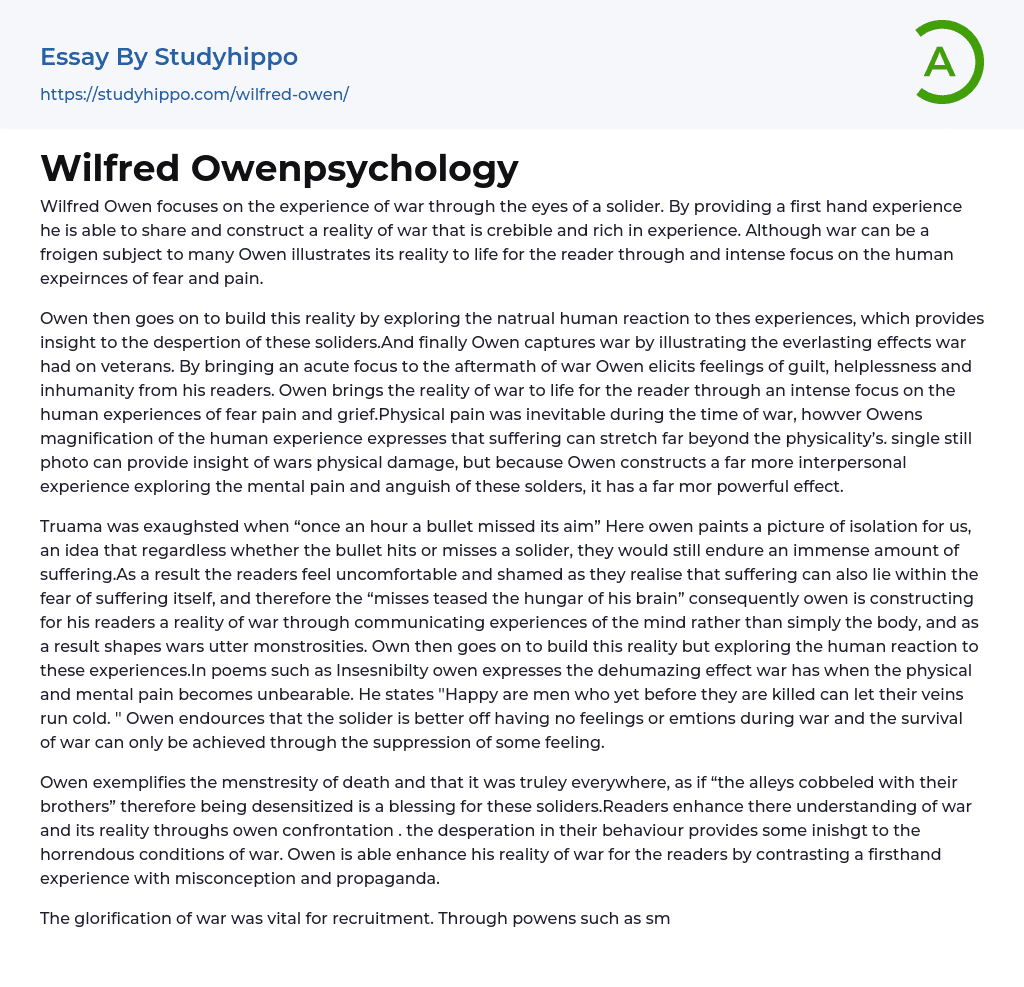In his writing, Wilfred Owen concentrates on depicting the war experience from a soldier's perspective. By presenting a personal account, Owen effectively communicates an authentic and vivid portrayal of what war is truly like. Despite the unfamiliarity of war to some readers, Owen brings its reality to life by emphasizing the real and raw human emotions of fear and agony.
In the text, Owen delves into the reality of war by examining the natural reactions of humans to such experiences. This helps shed light on the despair felt by soldiers. He also demonstrates the enduring effects of war on its veterans. By focusing on its aftermath, Owen evokes guilt, helplessness, and inhumanity in readers. Through emphasizing the human experiences of fear, pain, and grief, Owen brings the harsh reality of war to life. While physical pain is expected
...during times of conflict, Owen's emphasis on the mental pain and anguish suffered by soldiers is far more poignant than any single image could represent.
In this passage, Owen portrays the exhaustion of soldiers in war, where bullets constantly miss their aim, and consequently, immense suffering persists. Owen communicates the isolation of soldiers, where the fear of suffering lies beyond the physical pain of war itself. Through his poems such as Insensibility, Owen explores the dehumanizing effects of war on both physical and mental pain. He endorses the idea that it is better for soldiers to suppress their emotions during war, stating that only survival is achievable through doing so.
In his writing, Owen portrays the omnipresence of death in war and describes how soldiers become desensitized to it, as they are constantly surrounded by it. Thi
is seen where he compares alleys with brothers. This desensitization can be seen as a positive thing for soldiers. Owen's confrontational approach helps readers to comprehend the harsh realities of war. By describing the soldiers' desperate behaviors in such conditions, readers gain insight into just how horrific war can be. Additionally, Owen contrasts firsthand experience with propaganda and misconceptions to provide his readers with a better understanding of the true reality of war.
Recruiting soldiers was dependent on glorifying war, which was achieved through propaganda techniques like "smile, smile, smile." Owen's poetry, such as "Disabled," depicts war as a false concept by comparing it to a football player hailed as a hero despite being injured. The soldiers were convinced that going to war was a privilege, as seen when the soldier was drafted "with drums and cheers."
Present and past are juxtaposed in order to put greater emphasis on the tragedy. As a result, we are able to mourn the naivety and ignorance of the children with heightened understanding. One individual remarked that he would look godly in a kilt, and that is why they signed his name while smiling. This not only frustrates the reader but also provides some justification for why so many people would go to war if it was as horrifying as Owen paints it to be. Furthermore, Owen's portrayal of war is considered credible, making it even more confronting for readers.
By sharply portraying the aftermath of war, Owen captures its enduring impact on veterans, as evidenced in poems like "Disabled" and "Mental Case." Through his writing, Owen evokes emotions of guilt, helplessness, and inhumanity from his audience. In "Disabled," Owen emphasizes
the brutality of losing a limb and being confined to a wheelchair for the remainder of one's life. The soldier is now physically incomplete, but his mind remains fully intact. Moreover, Owen suggests that these soldiers were previously handsome and youthful, as indicated by the line "an artist for his silly face."
In his work, Owen highlights the wastefulness of attractive men "throwing away their knees" and emphasizes the lasting effects it will have on their lives. This leads readers to confront and feel guilty about the suffering these men endured. The concept of dehumanization is reintroduced as girls view these men as abnormal and repulsive rather than honoring them. Owen accurately portrays how war can impact a person's life by showing that the agony and pain experienced on the battlefield follows them home and haunts them for the rest of their life.
Essentially, Owen's poetry delivers a powerful and authentic depiction of war, highlighting its widespread brutality and the agony faced by soldiers. By emphasizing this cruelty and injustice, readers are prompted to criticize the actions of their government and feel a sense of guilt towards the soldiers who returned to an unchanged quality of life. In its entirety, Owen's work conveys the immense suffering brought about by war, exposing the harsh reality that lies beneath the propaganda.
- Abnormal Psychology essays
- Social Psychology essays
- Developmental Psychology essays
- Jean Piaget essays
- Positive Psychology essays
- Classical Conditioning essays
- Counseling essays
- Psychoanalysis essays
- Educational Psychology essays
- Behaviorism essays
- Authority essays
- Operant Conditioning essays
- Maslow's Hierarchy Of Needs essays
- Mental Health essays
- Personality Psychology essays
- Psychotherapy essays
- Family Therapy essays
- Stanford Prison Experiment essays
- Abraham Maslow essays
- Erik Erikson essays
- Cognitive Psychology essays
- Sigmund Freud essays
- Attachment Theory essays
- Supersize Me essays
- Individual essays
- Infant essays
- Childhood essays
- Adolescence essays
- Growth Mindset essays
- Is Google Making Us Stupid essays
- Childhood Memory essays
- Positive Attitude essays
- Reinforcement essays
- Archetype essays
- Maturity essays
- Deception essays
- Certainty essays
- Conformity essays
- Aggression essays
- Behavior essays
- Human Behavior essays
- Obedience essays
- Adult essays
- Procrastination essays
- Morality essays
- Altruism essays
- Human Sexuality essays
- Role Model essays
- Perseverance essays
- Expressive essays




